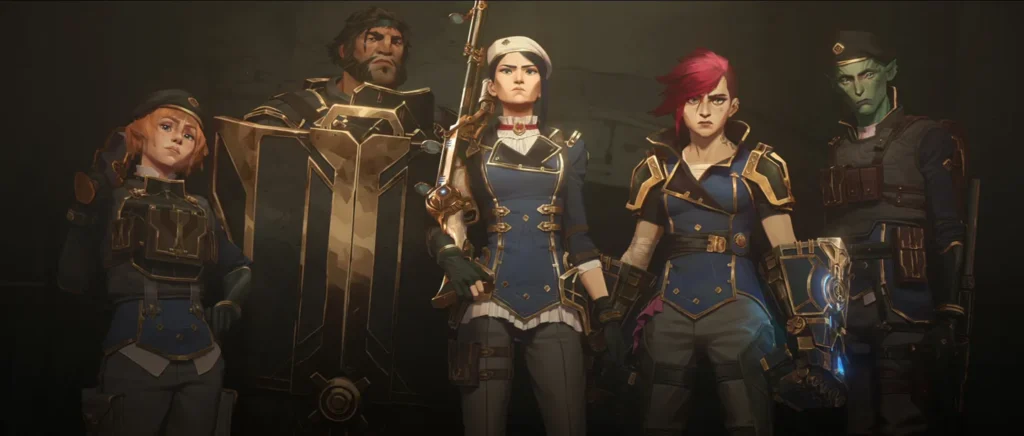Arcane Season 2: A Brutal Look at Revolution and War
- November 9, 2024
- 0
Arcane returns with its explosive second season, diving even deeper into a tale of revolution and societal decay. This final chapter picks up right where Season 1 left
Arcane returns with its explosive second season, diving even deeper into a tale of revolution and societal decay. This final chapter picks up right where Season 1 left

Arcane returns with its explosive second season, diving even deeper into a tale of revolution and societal decay. This final chapter picks up right where Season 1 left off, delivering a powerful narrative on the consequences of oppression. With rising stakes, complex characters, and high-octane action, Arcane Season 2 solidifies its place as a landmark in animation.

Season 1 of Arcane ended with Jinx’s shocking attack on Piltover’s council, shattering any hopes of peace. Now, in Season 2, viewers are thrust into the immediate aftermath. The destruction Jinx caused is massive, forcing a major shift in Piltover’s political landscape. Her actions have left Vi, her sister, and other survivors like Caitlyn Kiramman reeling as they confront the losses.
The new season delves into how societies breed the very “monsters” they later come to fear. Jinx’s rage against Piltover wasn’t random; it stemmed from years of systemic abuse. The cycle of oppression and retaliation forms the core of Arcane’s narrative, raising questions about the cost of justice and revenge.
At the heart of Arcane are Vi and Jinx, two sisters whose paths diverge violently. Their conflict is not just external; it’s a reflection of their own shattered identities. War has pulled them so far apart that they can no longer see themselves in each other. This season, the sisters’ confrontations reveal how war distorts self-perception, making them feel like strangers.
Arcane effectively portrays the personal cost of conflict. Vi and Jinx’s interactions are raw and emotionally charged, highlighting how, in war, the desire to harm the enemy often brings pain to oneself.
As Arcane pushes its narrative forward, Hextech—a powerful technology capable of immense destruction—becomes a central point of conflict. Jayce Talis, Piltover’s inventor, grapples with the weapon he helped create. Alongside politician Mel Medarda, he tries to control the growing demand for Hextech-fueled warfare, but not everyone is interested in restraint.
Ambessa, Mel’s war-hungry mother, sees Hextech as an opportunity for domination. This tension escalates as calls for a full-scale invasion of Zaun grow. The show paints a stark picture of escalation and unintended consequences. By exploring Hextech’s capabilities, Arcane reminds viewers that war’s outcomes are often unpredictable and devastating.
Arcane has always been celebrated for its visual artistry, and Season 2 elevates this even further. The action scenes, which showcase Hextech in all its dangerous glory, are breathtaking. The violence feels more intense, reflecting the brutal reality of a society at war. The animation is stunning, making every battle and emotional moment resonate with viewers.
However, the show’s choice of “cool” soundtrack moments occasionally feels out of sync with the grim themes. These needle drops, while appealing to diehard fans, can feel misplaced in scenes meant to convey serious, harrowing emotions.
Season 2 moves at a breakneck pace, with each episode packed with dense storytelling. The stakes are higher than ever, and Arcane splits the season into three acts to keep viewers engaged. This episodic release lets audiences digest the story’s heavy themes gradually, building anticipation for each act.
The structure allows the narrative to unfold organically without overwhelming viewers, a wise choice given the intense subject matter. The new season invites viewers to ponder the deeper issues—revolution, power, and identity—that make Arcane more than just an animated series.
With Season 2, Arcane cements its place as a revolutionary story about rebellion, identity, and survival. The show’s commitment to portraying the human toll of societal collapse, alongside its unmatched animation, makes it essential viewing. As the series heads into its final act, fans can expect even more thought-provoking moments and shocking revelations.
In the end, Arcane challenges viewers to consider the true cost of war, not just in terms of casualties, but in terms of lost identity and fractured relationships. Whether the series concludes with resolution or further upheaval, it has already left an indelible mark on the world of animation and storytelling.